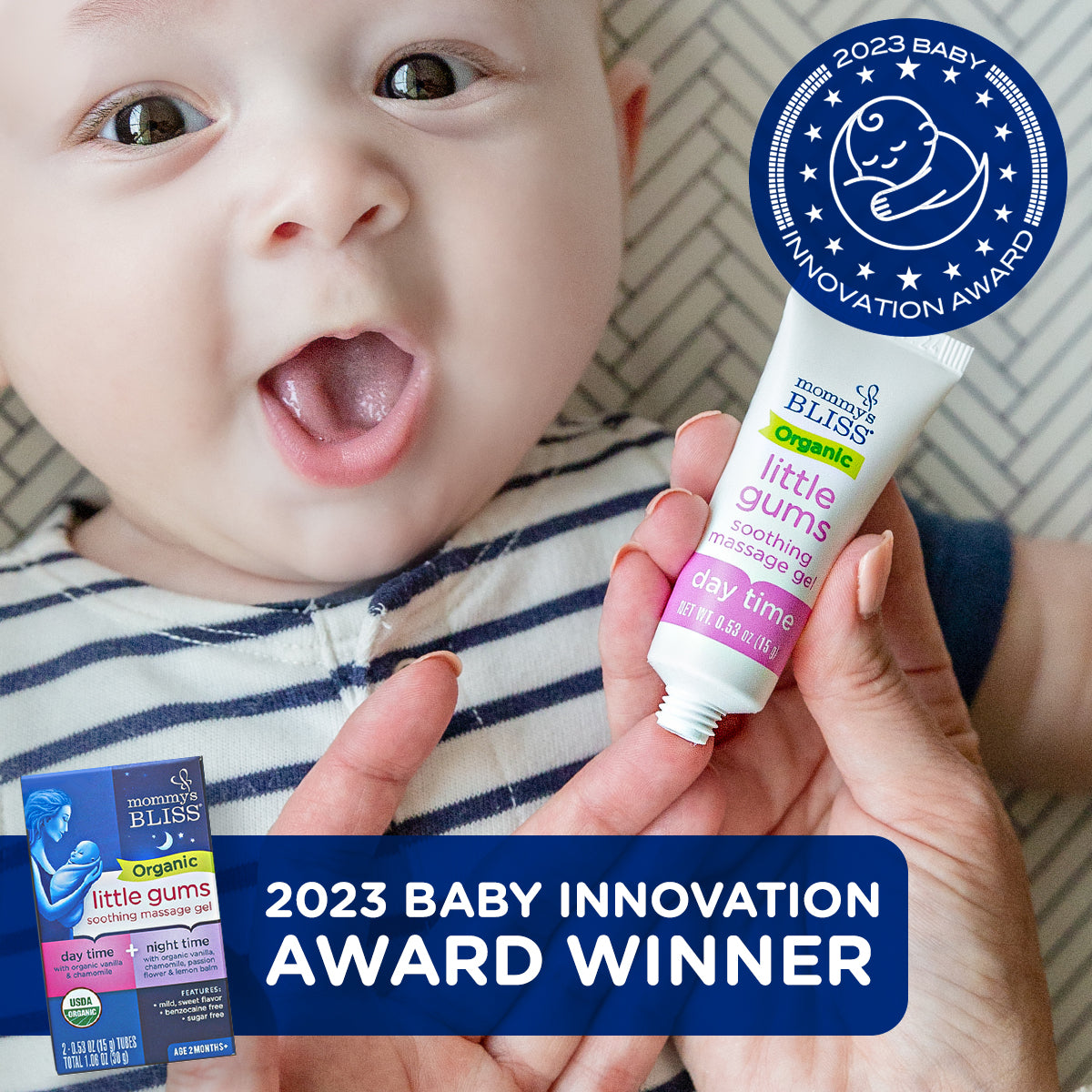How to care for baby’s adorable little newborn teeth? Spoiler alert…it’s never too early to start...teeth or not! For starters, good tooth care begins with great gum care. Before those baby teeth appear, amidst cheers and awe, and photo ops, the gums are tender and uncomfortable. It’s a notoriously tough time for babies and the grouchies are likely to follow. Wouldn’t you be grouchy if your gums were uncomfortable, and you didn’t know why? Rhetorical. And by the way, asking baby if their gums ache is like talking to a newborn. But you can soothe their hard-working tender gums with Mommy’s Bliss Little Gums Soothing Massage Gel. Just a drop of this magical gel with organic chamomile and vanilla on the tip of mommy’s finger for a mini massage and it’s smiles all around. Yes, this one won the 2023 Innovation Award...all those tiny gums can’t be wrong. Couple our Massage Gel with our new Soothing Oral Tablets to calm teething babies*. This is literally the dream team that works better together to help tackle teething.
Once those pearly wonders burst onto baby’s scene (or even before they do), let’s talk about how to take the very best care of them and set them up for future dental success. You’ve got questions…as you should.
When do I start brushing baby’s teeth?
Believe it or not, you can begin brushing baby’s gums before the first tooth appears. Simply run a soft infant toothbrush or clean, damp washcloth over little gums to remove harmful bacteria. As soon as baby has their first tooth, let the brushing begin – twice a day…even if it’s just that lone first pearly white. Talk with your doctor or dentist about toothpaste options and what they recommend. This is also the perfect time to schedule your baby’s first dental appointment to get them accustomed to visits – after the first tooth or on baby’s first birthday – whichever comes first. Typically, the first teeth to come in are the lower front teeth and most children will usually have all their baby teeth by age three. But don’t worry, it’s perfectly normal for some babies not to have a single tooth at their first birthday party. Normally, around 3 months old, you’ll notice baby exploring the world with their mouth, increased saliva and putting their hands in their mouths is all normal. The first tooth usually appears around 6 months old. As soon as baby’s teeth start touching, start flossing. Gently, of course. When your child is old enough, teach them to spit out the excess toothpaste and continue to watch them so they aren’t swallowing the toothpaste! Brush alongside them as a perfect example of how it’s done. Look at mommy’s pearly whites…healthy habits begin by example.
What if my baby refuses to open their mouths for brushing (We’ve been there)
Babies can be insistent – especially if gums are uncomfortable. The last thing baby wants is mom or dad getting close to brush or massage. If two grown-ups are available, the knee-to-knee approach works great. Place your child’s head in your lap while the other holds your child and chats with them, sings or distracts them if they’re upset. Try saying “uh oh” and open your mouth really wide and your little one may mimic you. Silly, but it works! You can also gently place a finger between the back gums to carefully hold mouth open for brushing. Brush gently but swiftly before they catch on. Hoping this blog finds you and your little one happy, healthy, and finding your way on your breastfeeding journey. Remember, it’s a marathon, not a sprint, so settle in, pump on, give yourself some grace, and enjoy the ride, if possible. You got this! And if you don’t...that’s ok too. Never forget – this is hard – and you’re amazing.
Can babies get tooth decay?
Believe it or not, even babies can get tooth decay. Putting a baby to sleep with a bottle can harm teeth thanks to the sugar in juice, formula or milk that lingers on baby’s teeth for hours. This sugar can eat away at tooth enamel leading to “bottle mouth” or “baby bottle tooth decay.” When this happens, baby’s teeth could get discolored, pocked or pitted, cavities may form and in severe cases, these teeth may need to be pulled. No baby (or mama) wants that! When kids are 6 months old, switch from a bottle to a sippy cup with a straw or a hard spout to prevent liquid from pooling around teeth.
What else should I know?
If your baby is fussy, gums are red and tender and they are drooling (more than usual), it’s likely teething. Massaging gums with clean fingers and Mommy’s Bliss Little Gums Soothing Massage Gel and add our new dissolvable Soothing Oral Tablets to calm upset teethers. This dynamic duo works wonders, as does a solid cold-filled teething ring, cold washcloths or a teething biscuit (be sure to keep a close watch with this one to avoid a choking hazard). If baby is still upset or uncomfortable due to red and painful gums, reach out to your pediatrician to ask if a weight-appropriate dose of acetaminophen or, if over 6 months, ibuprofen, would be helpful. Try to avoid teething products with benzocaine. The FDA has issued warnings against it due to potential side effects. With a few helpful pointers, and our award-winning gum massage gel, it’s easy to care for tiny new teeth, tender gums, and to teach baby good habits from the get-go. Healthy, pearly whites and a calm baby are such a sweet reward. The tooth fairy would be proud of both of you. Smiles all around.

This site is intended for informational purposes only and does not provide medical advice. Please consult your physician or other health-care professional.
